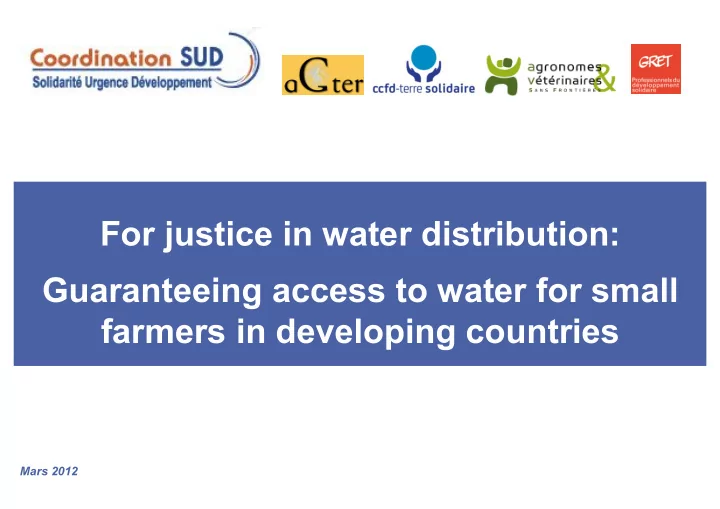

Page 1 For justice in water distribution: Guaranteeing access to water for small farmers in developing countries Mars 2012
1 rst statement : a double injustice for small farmers in the South 1. More and more 2. being deprived of their difficulties to access water historic rights to obtain this and land resource. Small farmers tend to have less political power than other more organised and powerful users, to obtain or maintain their water rights .... .... And this increase their economic and climatic vulnerabilities.
No! All farmers don’t waste water! … which kind of agriculture is responsible for such waste? ... The practices and traditional knowledge accumulated by individual farmers and rural communities in terms of sustainable water management should be recognised and promoted as an alternative to the dominant capital-intensive model of agriculture, which often consumes vast amounts of water.
No! All farmers don’t waste water! …. What kind of waste are we speaking about? Water is collected, distributed, drained and is returned to the water cycle. There are no water losses.... At a territorial level , small farmers collectively capture, share and distribute the resource. All the communities within the territory can then benefit from the recovery and use of ground water and replenished water tables. … Who benefits from this false statement ? Growing cities ? Tourism development ? "Capitalistic agriculture" or industries and mines which practices of water use are often not sustainable ? "Water" firms (irrigation technologies,, re-use…).
2 nd statement : Family farming has the potential to be highly productive Small farmers agriculture is in the South one of the solution to address the challenges of food security and sovereignty. The rainy areas have the greatest potential to increase yields , especially with agro-ecology Double the irrigated areas in West Africa should increase its contribution to world food supply form 5 to 11% until 2050.
3 rd statement : Water is essential for farmers to adapt to climate change and risks disturbances Small farmers have historical practices well adapted to climate risks: agricultural practices, simple water collection techniques (drainage, capture) and water storage in soils, new rules for sharing and access to resources in irrigated or pastoral areas. In order to strengthen the capacity of small farmers adaptation, it's necessary to promote and enhance those strategies of access and water managemen t.
4 th statement : Water distribution cannot be dictated by the market only Water is a common good that should be physically and economically accessible to everyone, without exception. It is essential to guarantee the food right, recognized by law in the international right. Denying farmers the right to access water may threaten the food sovereignty of the countries concerned and contributes to the economic and social destabilisation of certain areas . No to technical and legal uniform solutions on behalf of "modernization" and "water economy" Alternatives exist, more efficient for the society, more equitable and sustainable!
1 rt proposal: Investing smartly in water for agriculture Supporting the improvement and dissemination of simple agricultural practices and water management techniques (small dams, individual tanks, micro-irrigation, etc.), relevant to climate change adaptation and to enhance potential of rained areas Investing in construction and rehabilitation of irrigation infrastructures that are appropriate to local management capacitie s and recognize traditional know-hows and practices. Strengthening capacities of water management institutions (association of water users...) and monitoring institutions (irrigation service centers, technical services, etc.)
2 nd proposal: Defending and securing farmers’ rights to water Supporting rural development policies that: promote recognition and securing water rights , in all their diversity (including land security) Guarantee a institutional framework benefitting to small farmers (land security, prices, market access, credit, etc.) Given the rise in large-scale appropriation of land and the massive cornering of water resources : Make recognise the rights of existing users and farmers . submit investors projects to prior assessment taking into account the interest of people and the country and the social and environmental impacts ; and publish these evaluations.
3 rd proposal: Promoting inclusive and democratic water management Promoting dialogue platforms for fair sharing of water among users, activity sectors, cities and rural areas, with a real participation of small farmers representatives. Strengthening capacities of civil society and small farmers organisations, so that they participate in the decisions making regarding water management.
Thanks
Recommend
More recommend